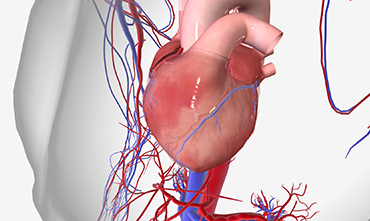Pericarditis

Pericarditis refers to the inflammation of the pericardium, the protective sac surrounding the heart. This condition can cause sharp chest pain, particularly when breathing deeply or lying down, and may lead to complications such as fluid buildup around the heart (pericardial effusion). While many cases resolve with proper rest and medication, severe cases may require medical intervention. Some individuals may experience recurring episodes, making long-term management essential.
Types of Pericarditis
Pericarditis can be classified into different types based on its cause and duration:
- Acute Pericarditis: Develops suddenly and typically lasts a few weeks.
- Chronic Pericarditis: Symptoms persist for three months or longer.
- Constrictive Pericarditis: A severe form where the pericardium thickens, restricting heart movement.
- Infectious Pericarditis: Caused by viral, bacterial, fungal, or parasitic infections.
- Idiopathic Pericarditis: When the cause is unknown.
- Traumatic Pericarditis: Results from chest injuries or trauma.
- Uremic Pericarditis: Linked to kidney failure.
- Malignant Pericarditis: Occurs due to cancer spreading to the pericardium.
Symptoms
Pericarditis symptoms can vary but often include:
- Sharp, stabbing chest pain that worsens with deep breaths or lying flat but improves when sitting up.
- Pain spreading to the shoulders, neck, or back.
- Shortness of breath, especially when reclining.
- Heart palpitations or irregular heartbeat.
- Dry cough, fever, or fatigue.
- Swelling in the legs, feet, or abdomen (in severe cases).
Causes and Risk Factors
While the exact cause of pericarditis is often unknown (idiopathic pericarditis), several factors may contribute to its development:
- Infections: Viral (most common), bacterial, fungal, or parasitic.
- Autoimmune conditions: Lupus, rheumatoid arthritis, or scleroderma.
- Heart-related conditions: Heart attacks, surgery, or radiation therapy.
- Kidney disease: Uremic pericarditis due to kidney failure.
- Trauma or injury: Chest injuries from accidents or medical procedures.
- Cancer: Certain cancers can spread to the pericardium.
- Medication effects: Some drugs can trigger inflammation in rare cases.
Diagnosis
A healthcare provider may diagnose pericarditis based on medical history, symptoms, and diagnostic tests such as:
- Electrocardiogram (ECG/EKG): Detects abnormal heart rhythms.
- Echocardiogram (Echo): Assesses fluid buildup around the heart.
- Cardiac MRI or CT Scan: Provides detailed imaging of the pericardium.
- Blood tests: Checks for inflammation markers and infections.
Treatment Options
Most cases of pericarditis improve with:
- Medications
- Anti-inflammatory drugs (NSAIDs) like ibuprofen.
- Colchicine to prevent recurrence.
- Steroids (in severe cases).
- Antibiotics or antifungal medications if an infection is the cause.
- Medical Procedures:
- Pericardiocentesis: Draining excess fluid if pericardial effusion occurs.
- Pericardiectomy: Surgical removal of part of the pericardium in chronic or constrictive pericarditis cases.
Prevention & Management
While pericarditis cannot always be prevented, taking the following steps may help reduce the risk or recurrence:
- Managing infections and underlying conditions.
- Avoiding strenuous activity during recovery.
- Regular monitoring if a previous episode has occurred.
When to Seek Medical Attention
Seek immediate medical care if you experience:
- Severe chest pain lasting more than a few minutes.
- Shortness of breath.
- Dizziness or fainting.
Proper diagnosis and timely treatment can help ensure a full recovery and prevent complications.




